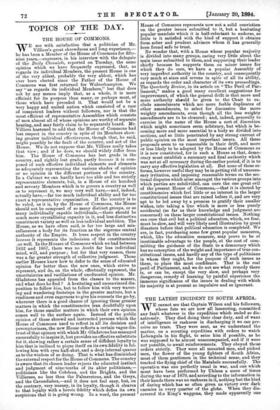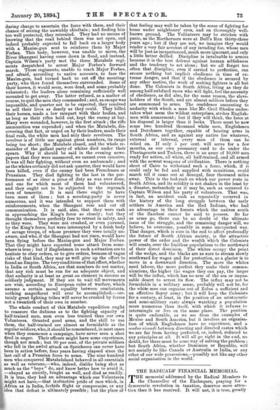THE LATEST INCIDENT IN SOUTH AFRICA.
WE cannot see that Captain Wilson and his followers,. whose fate we are now all lamenting, committed any fault whatever in the expedition which ended so dis- astrously. They died doing their clear duty, and of want of intelligence or rashness in discharging it we can per- ceive no trace. They were sent, as we understand the- matter, on a scouting expedition with orders to watch Lobengula in his flight, to seize him if possible, as he was supposed to be almost unaccompanied, and if it were not possible, to await reinforcements. They obeyed those orders strictly. They were all mounted men, and picked men, the flower of the young fighters of South Africa, most of them gentlemen in the technical sense, and they tracked the flying chief of the Matabele successfully. The operation was one perfectly usual in war, and one which must have been performed by Ilhlazus a score of times during the war of 1870, and according to the information in their hands there was no rashness in it, nothing but the kind of daring which has so often given us victory over dark- enemies in every quarter of the globe. When they dis- covered tle King's waggons, they made apparently one daring charge to ascertain the force with them, and their chance of seizing the unwieldy chieftain ; and finding him too well protected, they retreated. They had no means of knowing that the road behind them was not open, and indeed probably expected to fall back on a larger body with a Maxim-gun sent to reinforce them by Major Forbes. This body, however, was unable to move, the River Shangani having come down in flood, and instead, Captain Wilson's party met the three Matabele regi- ments despatched to arrest Major Forbes's forward march. These regiments, unable to reach Major Forbes, and afraid, according to native accounts, to face the Maxim-gun, had turned back to cut off the scouting- party, who thus found themselves surrounded. Some of their horses, it would seem, were dead, and some probably exhausted ; the leaders alone remaining sufficiently well mounted to get away. The latter refused, as a matter of course, to quit the men they commanded ; and, as escape was impossible, and quarter not to be expected, they resolved to sell their lives as dearly as they could. They killed their horses, made a low rampart with their bodies, and as long as their rifles held out, kept the enemy at bay. Many were wounded, however, in the first attack • the rifle ammunition was expended ; and when the Matabele, dis- covering that fact, or urged on by their leaders, made their final rush, the white men had only their revolvers. The revolver is of little use against great numbers, its range being too short; the Matabele closed, and the whole re- mainder of the gallant party of whites died under their spears. Why it should be said in the evening news- papers that they were massacred, we cannot even conceive. It was all fair fighting, without even an ambuscade; • and as the whites certainly did not ask quarter, they would have been killed, even if the enemy had been Frenchmen or Prussians. They died fighting to the last in the per- formance of as clear a piece of duty as was ever done, and one for which most of them had volunteered, and they ought not to be subjected to the reproach even of temerity. It is said there ought to have been more of them ; but a v is never numerous, and it was intended to support them with reinforcements, when the Shangani rose and cut off communication. It is said, also, that they were rash in approaching the King's force so closely ; but they thought themselves perfectly free to retreat in safety, and so they were. They were not crushed, or even pursued, by the King's force, but were intercepted by a fresh body of savage troops, of whose presence they were totally un- aware, and who, if the Shangani had not risen, would have been flying before the Maxim-gun and Major Forbes. That they might have expected some attack from some- where is true ; but if Englishmen in such a situation are to hesitate to obey orders, or to give orders, because of vague risks of that kind, they may as well give up the effort to found an Empire. The very conditions of that effort, whether in India or South Africa, are that numbers do not matter, that any risk must be run for an adequate object, and that audacity is at least as great an element in success as soldierly judgment. If they are to wait till movements are wise, according to European rules of warfare, which assume a certain moral equality between combatants, nothing magnificent will ever be accomplished,—cer- tainly great fighting tribes will never be crushed by forces not a twentieth of their own in number.
The whole conduct of this Matabele expedition ought to reassure the dubious as to the fighting capacity of lin If-trained men, men even less trained than our own Volunteers. Granted good arms, and the skill to use them, the half-trained are almost as formidable as the regular soldiers, who, it should be remembered, in most cases when they commence a campaign, have never seen a shot fired in anger. Their officers might have some experience, though not much ; but 90 per cent, of the private soldiers who fell in the awful attack on Speicheren can never have been in action before, four years having elapsed since the last call of a Prussian force to arms. The nine hundred men who conquered Matabeleland behaved in all essentials as well as veterans,—who, indeed, dislike being shot as much as the " boys " do, and know better how to avoid it, —obeyed as strictly, fought as well, and died as readily. It is true, they had an advantage which our Volunteers might not have,—that instinctive pride of race which, in that feeling may well be taken by the sense of fighting for home under neighbours' eyes, and on thoroughly well- known ground. The Volunteers may be stricken with panic, as the Northerners were at Bull's Run thirty-three years ago ; but if they are not, we imagine they would render a very fair account of any invading foe, whose men will be just as inexperienced, much more ignorant, and only a little better drilled. Discipline is invaluable to armies because it is the best defence against human selfishness and the tendency to act alone ; but we all forget too often that discipline, even if carried to perfection, can secure nothing but implicit obedience in time of ex- treme danger, and that if the obedience is secured by any other motive, the work of making fighters is all but done. The Colonists in South Africa, living as they do among half-subdued races who will fight, feel the necessity of obedience, as did also, for the same reason, the slave- holders of the South, and are almost soldiers before they are summoned to arms. The confidence amounting to audacity with which a man like Mr. Cecil Rhodes under- takes what seem the wildest enterprises, strikes English- men with amazement ; but if they will think, the force at his disposal is larger than it looks. There must be now some two hundred thousand white men, Englishmen and Dutchmen together, capable of bearing arms in South Africa, and as against any native foe whatever, external or internal, every man of them can be relied on. If only 5 per cent. will serve for a few months, as our own yeomanry used to do under the Plantageuets and Tudors, there is an army of 10,000 men ready for action, all white, all half-trained, and all armed with the newest weapons of civilisation. There is nothing short of Cairo to withstand such a force, which, if it could only be fed and supplied with munitions, could march till it came out at Senegal, four thousand miles away. This is the bed-rock on which our power rests in South Africa, and its solidity is not shaken in the least by a disaster, melancholy as it may be, such as occurred to Captain Wilson and his party of volunteers. That was, in fact, an accident such as repeatedly occurred in the history of the long struggle between the early settlers in America and the Red Indians, who had an advantage in their forests which the natives south of the Zambesi cannot be said to possess. So far as arms go, there can be no doubt of the ultimate issue of the struggle, and the remaining danger will, we believe, be overcome, possibly in some unexpected way. That danger, which is sure in the end to affect profoundly the future of South African society, is the attractive power of the order and the wealth which the Colonists will create, over the limitless populations to the northward of their direct dominion. The whites occupy the point of the wedge, and the blacks are as sure to stream slowly southward for wages and for protection, as a glacier is to move in a downward direction. The more the whites need labour, the more perfect they make their commu- nications, the higher the wages they can pay, the larger will be the influx, which has no arm of the sea or impas- sable desert to arrest its flow. The influx may not be formidable in a military sense, probably will not be, for the white men can organise out of Zulus a sufficient and an effective Sepoy army ; but it will keep the Colonists for a century, at least, in the position of an aristocratic and semi-military caste always watching a population more numerous than itself, with which it refuses. to intermingle or live on the same plane. The position is quite endurable, as we see from the examples. of Mexico and South America, but it involves an orgamsa- tion of which Englishmen have no experience, and a modus vivendi between directing and directed castes which we are far from having perfected, or, indeed, reduced to any principles at all. It will all go right in the end, no doubt, for there must be some way of solving the problem ; but South Africa, whether Dominion or Republic, will not socially be like Canada or Australia or India, or any other of our wide possessions,—possibly not like any other social organisation in the world.



































 Previous page
Previous page